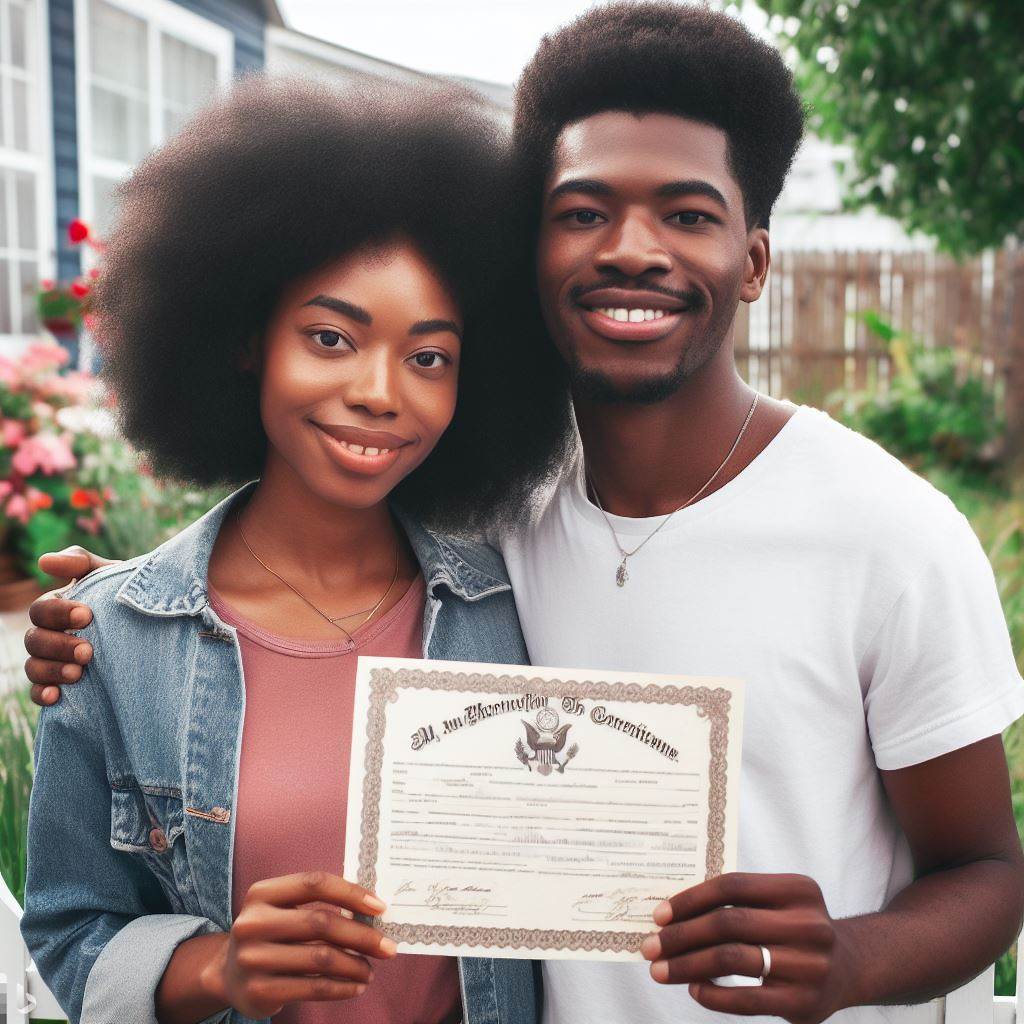Introduction
The legal implications of getting married in the USA for Nigerians are of utmost importance.
Understanding these implications is vital to ensure a smooth and legally valid marriage.
In this blog post, we will cover the main points related to this topic.
Importance of understanding the legal implications of getting married in the USA for Nigerians
- Firstly, understand the legal requirements and processes involved in a Nigerian getting married in the USA. This knowledge will prevent any complications that may arise during or after the marriage.
- One important point to consider is the recognition of marriages performed in the USA in Nigeria.
Nigerians should determine if their country of origin recognizes marriages conducted abroad to ensure their marriage is legally binding upon returning to Nigeria. - Another aspect to understand is the paperwork and documentation required for a marriage in the USA.
It is essential to have the appropriate visas, passports, and any other necessary documents to ensure a legal marriage. - Additionally, Nigerian couples planning to marry in the USA must familiarize themselves with the specific marriage laws of the state they intend to marry in.
Each state might have different requirements, such as waiting periods, blood tests, or parental consent.
Overview of the main points to be covered in the blog post
Understanding the legal implications of marrying in the USA empowers Nigerians to safeguard their rights and interests.
Knowledge of the legal system will enable couples to address issues such as property rights, spousal support, and child custody if the marriage ends in divorce.
Planning to marry in the USA? It’s vital for Nigerians to stay aware of the legal implications
This knowledge will not only ensure a legally valid marriage but also protect their rights and interests throughout the marriage.
Legal requirements for getting married in the USA
Documentation needed for obtaining a marriage license
To marry in the United States as a Nigerian citizen, one must understand the involved legal requirements
This section will outline the necessary documentation needed to obtain a marriage license and highlight possible differences in requirements between states.
In order to obtain a marriage license in the United States, there are several documents that Nigerian individuals must provide:
- Valid identification: Nigerian citizens must present a valid passport or driver’s license.
- Social security numbers: Both individuals getting married must provide their social security numbers.
- Proof of age: Typically, a birth certificate or other official document proving age is required.
- Proof of marital status: If either individual has been previously married, they must provide divorce decrees or death certificates for their previous spouse.
- Additional requirements: Some states may require blood tests or medical certificates before issuing a marriage license.
Possible differences in requirements between states
It is important to note that requirements for obtaining a marriage license can vary between states. Here are some notable differences to consider:
- Minimum age to marry: The minimum age to marry differs across states, typically ranging from 16 to 18 years old.
- Residency requirements: Certain states have residency requirements, meaning that one or both individuals must have lived there for a certain period of time before getting married.
- Waiting periods: Some states have waiting periods between obtaining the marriage license and actually conducting the ceremony.
- Witnesses: The number of witnesses required when getting married can vary by state.
- Recognition of common-law marriage: While some states recognize common-law marriages, others do not. It’s essential to understand the legal status in the chosen state.
- Same-sex marriage: Same-sex marriage is legal nationwide, but additional requirements may exist in individual states, such as documentation or ceremony limitations.
It is crucial for Nigerian individuals planning to get married in the United States to familiarize themselves with both the general and specific requirements of the state where they plan to tie the knot.
Consulting with legal professionals or researching state-specific marriage laws can ensure a smooth and legally valid marriage ceremony.
Read: Bridal Trains and Their Significance in Nigerian Weddings
Recognition of Nigerian marriages in the USA
In this blog section, we will discuss the recognition of Nigerian marriages in the USA, the principles followed by the USA in recognizing foreign marriages, and highlight potential challenges or limitations in the recognition of Nigerian marriages.
Principles followed by the USA in recognizing foreign marriages
- The Principle of Comity: The USA recognizes foreign marriages based on the principle of comity, which means giving respect and deference to the laws and judgments of other countries.
- Legal Capacity: The marriage must have been legally entered into in Nigeria, following the Nigerian laws and regulations regarding marriage.
- Consent: Both parties must have given their free and informed consent to enter into the marriage without any coercion or fraud.
- Incompatibility with Public Policy: The USA may refuse to recognize a Nigerian marriage if it violates the fundamental principles or public policy of the USA.
- No Polygamous Marriages: The USA generally does not recognize polygamous marriages, and therefore, Nigerian marriages involving multiple spouses may not be recognized.
Potential challenges or limitations in the recognition of Nigerian marriages
- Age of Consent: If the minimum age for marriage in Nigeria is lower than the age of consent in the USA, the marriage may not be recognized.
- Same-Sex Marriages: Same-sex marriages, which are not recognized in Nigeria, may face challenges in being recognized in the USA due to conflicting laws and societal views.
- Validity of Marriage Documents: The validity and authenticity of the Nigerian marriage documents may be questioned, requiring additional legal processes and documentation.
- Divorce and Dissolution: The USA may not automatically recognize a Nigerian divorce or dissolution of marriage, leading to potential complications in obtaining a divorce in the USA.
- Pre and Post-nuptial Agreements: The validity and enforceability of pre and post-nuptial agreements entered into in Nigeria may vary in the USA, and may not be recognized in certain states.
In summary, the USA follows the principle of comity in recognizing Nigerian marriages, but there are certain challenges and limitations that individuals may face.
It is important for Nigerians planning to marry in the USA to understand the legal requirements, potential challenges, and seek legal advice to ensure the recognition and validity of their marriage in the USA.
Read: Intricacies of the Nigerian White Wedding Ceremony
Immigration implications for Nigerian spouses
When it comes to the immigration implications of getting married in the USA for Nigerians, there are certain considerations and processes that need to be understood.
Here is an overview of visas and immigration options for married couples:
Visas and immigration options for married couples
- When a Nigerian marries a US citizen, they have various options for obtaining a visa to enter and reside in the USA. The most common visa category for spouses is the CR1 or IR1 immigrant visa.
- The CR1 visa is designed for couples who have been married for less than two years, while the IR1 visa is for couples who have been married for more than two years.
- These visas allow Nigerian spouses to enter the USA as lawful permanent residents.
Process of obtaining a spousal visa
- To begin the process, the American spouse must file a petition on behalf of their Nigerian spouse with the U.S. Citizenship and Immigration Services (USCIS).
The petition should include proof of the marital relationship and supporting documents. - Once the petition is approved, it is forwarded to the National Visa Center (NVC) for further processing.
- The Nigerian spouse will then be required to undergo a medical examination and attend an interview at the U.S. Embassy or Consulate in Nigeria.
- If the visa is approved, the Nigerian spouse will receive their immigrant visa and can enter the USA.
- Within a few weeks of arrival, they will receive their Green Card, granting them permanent residency in the country.
Specific requirements or restrictions for Nigerian citizens
- Nigerian citizens face certain challenges when applying for spousal visas. Due to concerns over fraudulent marriages, Nigerian applications may undergo extra scrutiny.
- It is crucial for Nigerian spouses to provide substantial evidence of their genuine and bona fide marital relationship, such as wedding photographs, joint bank accounts, lease agreements, and testimonies from family and friends.
Demonstrating the legitimacy of the marriage is essential to overcome these additional barriers. - In addition, Nigerian spouses may also be subject to security checks, background screenings, and interviews to ensure their eligibility for a spousal visa.
Preparation is crucial; they must be ready and offer truthful, accurate information during these processes
To summarize, Nigerian citizens who marry US citizens need to understand the immigration implications that come with it.
Obtaining a spousal visa is a complex process, requiring evidence of the authenticity of the marriage.
By meeting the specific requirements and restrictions, Nigerian spouses can navigate the immigration process successfully and start their married life in the USA.
Read: Cultural Insights: How Marriage Forms Reflect Nigerian Traditions

Property rights and financial implications
Marrying in the USA holds substantial legal implications for Nigerians, especially concerning property rights and financial considerations
This section will discuss various aspects related to property ownership, division in case of divorce or death, and the differences between Nigerian and American laws in this regard.
Property Ownership and Division
- In marrying in the USA, Nigerians face vital legal implications regarding property ownership and division during divorce or death
- In Nigeria, the legal framework for property division is based on the concept of customary law, which differs significantly from the approach in American law.
Customary law typically favors male heirs over female heirs and can lead to unequal distribution of assets. - In contrast, American law follows the principle of equitable distribution, which seeks to divide assets fairly based on a variety of factors, regardless of gender.
This can result in a more balanced distribution of property between spouses.
Community Property States and Equitable Distribution States
- Another important consideration is the distinction between community property states and equitable distribution states within the USA.
- Community property states, such as California, Texas, and Arizona, view all property acquired during the marriage as belonging equally to both spouses.
In case of divorce or death, each spouse is entitled to half of the community property. - On the other hand, equitable distribution states, including New York, Florida, and Illinois, focus on a fair distribution of assets based on various factors like the duration of marriage, financial contributions, and the future financial prospects of each spouse. The division may not be equal but aims to be fair in the given circumstances.
Differences between Nigerian and American laws
- There are several significant differences between Nigerian and American laws regarding property rights and financial implications.
- Nigeria doesn’t recognize community property. Customary law determines property ownership, potentially favoring male heirs and leading to unequal distribution.
This stark contrast to American laws can have profound implications for Nigerians marrying in the USA.
- Additionally, the principle of equitable distribution in American law ensures a fair division of assets, considering multiple factors.
This approach aims to protect the rights and financial wellbeing of both spouses, irrespective of gender. - Be aware of these differences and understand potential consequences for property rights and financial interests when Nigerians get married in the USA
- Highly recommend consulting a legal professional experienced in both Nigerian and American laws to navigate these complex matters
Consider property rights and financial implications when Nigerians get married in the USA, emphasizing their importance
Understanding the differences between Nigerian and American laws, as well as the concepts of property ownership, division in case of divorce or death, and community property states versus equitable distribution states, is essential for a secure and fair outcome.
Read: How to Obtain a Marriage Certificate in the USA: Step-by-Step
Custody and child-related issues
Custody laws in the USA
- Understand the legal framework of custody laws in the United States to navigate potential challenges effectively.
- Understanding custody laws is crucial for Nigerian couples navigating the legalities of marriage in the USA. State laws often dictate custody arrangements in divorce or separation cases.
- The best interest of the child is a paramount factor, considering factors like parental fitness, stability, and the child’s wishes depending on age.
- Awareness of the legal intricacies surrounding child custody is crucial to ensure a smooth and legally sound marital journey.
This section delves into the specifics of custody laws in the USA and sheds light on the nuances that Nigerian couples must comprehend.
Potential challenges for Nigerian spouses in obtaining custody rights
- Explore the obstacles Nigerian spouses might face when seeking custody rights in the US legal system.
- The journey of securing custody rights can be laden with challenges for Nigerian spouses in a foreign legal system.
- Nigerian spouses may encounter complexities in securing custody rights due to cultural and legal differences.
- Understanding the American legal system, cultural nuances, and overcoming potential biases are challenges that require careful consideration.
Requirements or legal procedures to ensure the protection of children’s interests
- To safeguard children’s interests, adherence to legal requirements and procedures is essential.
- This may include establishing a parenting plan, attending court hearings, and cooperating with authorities.
- Seeking legal counsel ensures compliance with regulations and promotes a child-centered approach during legal proceedings.
Importance of legal representation
Significance of hiring competent legal representation to navigate the complexities of custody disputes.
Factors influencing custody decisions
Various factors considered by courts in determining custody, such as the child’s well-being, parental fitness, and stability.
Consideration of cultural differences and biases
Awareness about potential cultural biases that Nigerian spouses might encounter in custody proceedings.
Seeking mediation or alternative dispute resolution
Parties to explore mediation or alternative dispute resolution methods to resolve custody issues amicably.
Proof of parental ability and involvement
The importance of demonstrating active parental involvement and the ability to provide a stable and nurturing environment.
Impact of relocation
The legal implications and challenges associated with interstate or international relocation for the custodial and non-custodial parents.
Child support obligations
Information on the obligations of Nigerian spouses concerning child support payments to ensure the children’s financial stability.
Dealing with parental alienation
The issue of parental alienation and offer strategies to prevent and navigate such challenges to the well-being of the child.
Access and visitation rights
The rights of the non-custodial parent to access and visitation and elaborate on any restrictions or legal requirements.
Ensuring the enforcement of custody orders
The procedures and options available to enforce custody orders if one parent fails to comply.
The role of social services and child welfare agencies
The involvement of social services and child welfare agencies in custody disputes and their impact on the proceedings.
The importance of documenting evidence
Nigerian spouses to maintain detailed records and evidence to support their case regarding custody and child-related matters.
Seeking emotional support
Nigerian spouses can seek emotional support from friends, family, or counseling professionals throughout the challenging custody process.
This section emphasized on the need for Nigerian spouses to be informed and proactive in navigating custody and child-related issues in the US legal system,
Pre-nuptial agreements and their legal validity
Overview of pre-nuptial agreements in the USA
Couples enter into prenuptial agreements, commonly known as prenups, before marriage to establish terms and conditions
Explanation of their enforceability and limitations
- In the USA, prenups are generally recognized and enforceable, provided they meet certain legal requirements.
- However, there are limitations to what can be included in a prenup, such as child custody and support.
Importance of considering a pre-nuptial agreement for Nigerian couples
For Nigerian couples planning to get married in the USA, a prenup can have several advantages.
- Protecting assets: A prenup can specify how assets will be divided and protected in case of divorce.
- Financial security: It can ensure financial security and avoid potential disputes related to property and debts.
- Business interests: If one or both partners own businesses, a prenup can safeguard their interests.
By considering a prenup, Nigerian couples can have peace of mind and a clear understanding of their legal rights and responsibilities.
Legal Protections and Responsibilities of Marriage
Marriage is a legally binding contract that comes with various rights and responsibilities.
Complying with legal obligations is crucial, especially when Nigerian citizens marry in the United States. Understand and adhere to them
While there may be some differences between Nigerian and American laws in this area, it is essential to be aware of the legal protections and responsibilities that come with marriage.
Description of Legal Rights and Responsibilities
- Spousal support: One of the legal protections in marriage is the obligation to provide financial support to one’s spouse in times of need.
- Inheritance rights: Marriage grants spouses the right to inherit the property of their deceased partner, subject to applicable laws.
- Healthcare decisions: Being married allows partners to make medical decisions on behalf of each other in case of incapacitation.
- Immigration benefits: Marriage can provide opportunities for a Nigerian citizen to obtain legal residency in the United States.
- Tax advantages: Married couples often enjoy tax benefits, such as filing joint tax returns and sharing deductions.
- Parental rights: In the case of having children, marriage provides legal recognition and protection for both parents.
- Shared property: Marriage establishes joint ownership of property acquired during the marriage.
- Debt responsibility: Spouses may share responsibility for each other’s debts incurred during the marriage.
Potential Differences between Nigerian and American Laws
- It is crucial to note that there may be some differences between Nigerian and American laws regarding marriage and its legal implications.
- While both countries recognize marriage as a legal institution, variations may exist in terms of property rights, divorce procedures, and gender roles within the marriage.
- In Nigeria, for instance, traditional customs and religious laws may influence certain aspects of marriage, including polygamy and divorce practices.
- In contrast, American law generally prohibits polygamy and follows a formalized divorce process.
- Furthermore, the legal recognition of same-sex marriage can vary between Nigeria and the United States. Same-sex marriage is illegal under Nigerian law, while the United States legally recognizes it in several states.
Importance of Understanding and Complying with Legal Obligations
- Understanding and complying with legal obligations in marriage is crucial for Nigerians getting married in the United States.
- Failure to do so can have significant consequences, ranging from legal disputes to financial hardships. It is highly recommended to consult with legal professionals who specialize in international family law to ensure compliance with both Nigerian and American legal requirements.
- Educating oneself about the legal protections and responsibilities of marriage will help Nigerian couples navigate potential challenges and maintain a healthy relationship.
- By knowing their rights and obligations, couples can protect their assets, make informed decisions, and foster a strong partnership.
Ultimately, marriage brings about certain legal protections and responsibilities that should not be taken lightly.
To fully understand their rights and obligations, Nigerian citizens marrying in the United States should be familiar with both Nigerian and American laws
Seeking legal guidance and ensuring compliance with these obligations will contribute to a successful and legally sound marital union.
Conclusion
Significance of being aware of the legal implications of getting married in the USA for Nigerians
- Overall, it is vital for Nigerians to be aware of the legal implications of getting married in the USA. Understanding the legal requirements and obligations can help avoid future issues and complications.
- Throughout this blog post, we have discussed several key points. Firstly, we noted that Nigerian marriages are recognized in the USA if they comply with state laws.
- Secondly, we highlighted the importance of obtaining a marriage license and having a legally valid wedding ceremony.
- Furthermore, we explored the consequences of not fulfilling the legal requirements, such as the risk of voiding the marriage and potential immigration issues.
- We also emphasized the significance of prenuptial agreements to protect the interests and rights of both parties.
Encourage readers to seek professional advice and guidance for specific legal situations
- In light of these discussions, it is crucial for Nigerians intending to marry in the USA to seek professional advice and guidance.
- Every legal situation is unique, and consulting with an immigration lawyer or family law attorney can provide personalized recommendations.
- To summarize, being informed about the legal implications of getting married in the USA is essential for Nigerians.
- Seeking professional assistance will ensure compliance with all necessary legal processes and avoid potential complications in the future.




